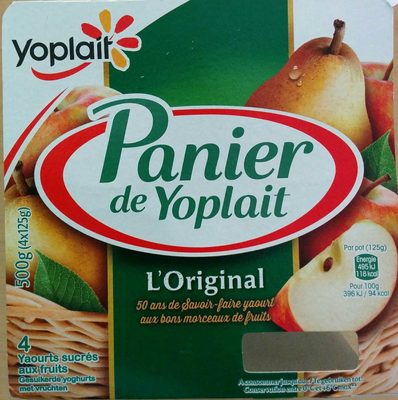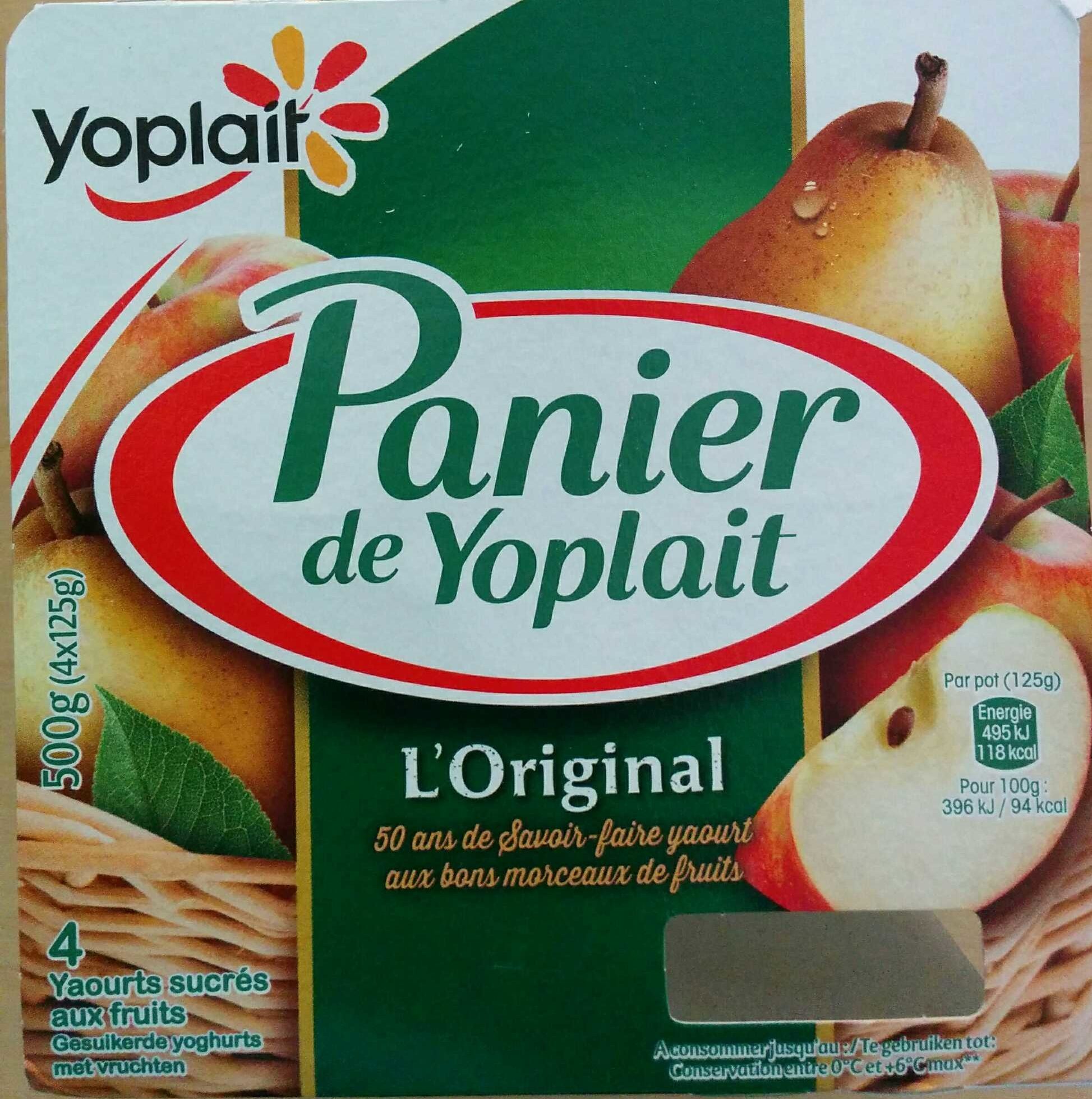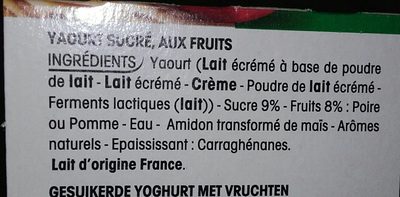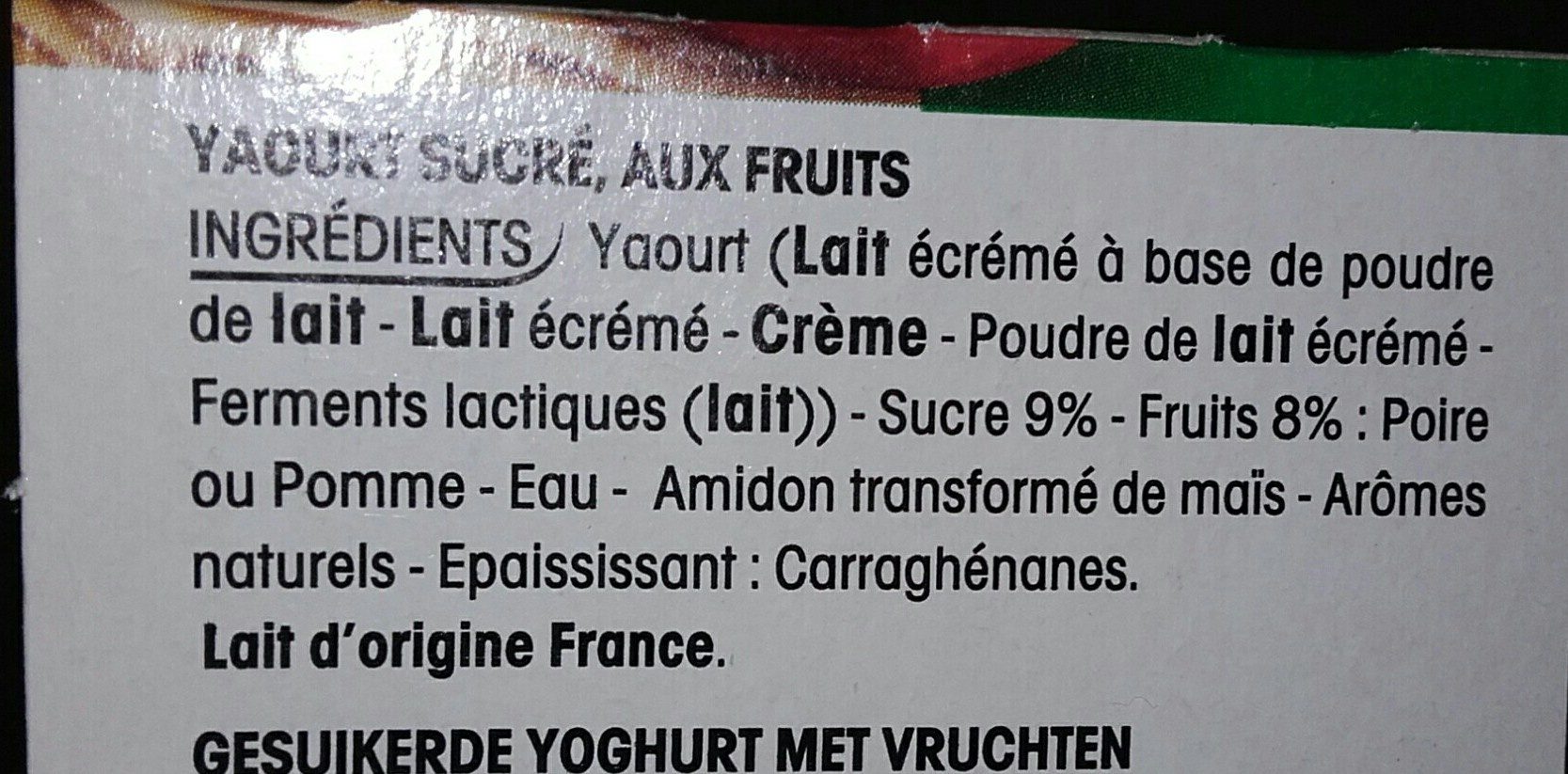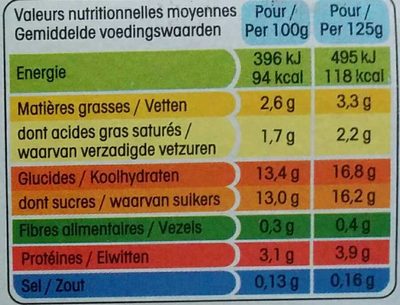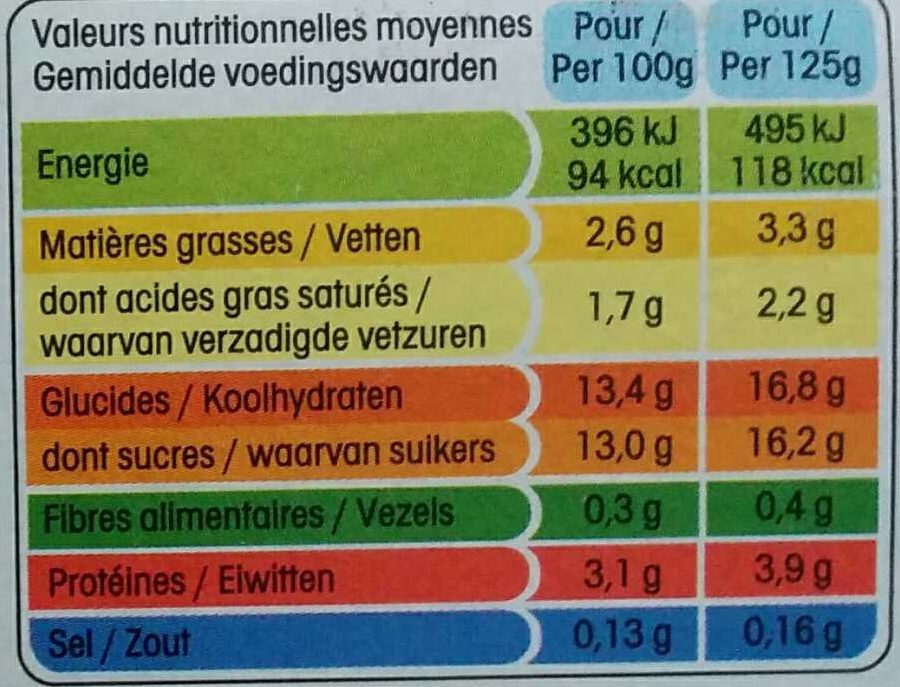Help us make food transparency the norm!
As a non-profit organization, we depend on your donations to continue informing consumers around the world about what they eat.
The food revolution starts with you!
Panier de Yoplait L'Original Pomme Poire - 500 g (4 * 125 g)
Panier de Yoplait L'Original Pomme Poire - 500 g (4 * 125 g)
This product page is not complete. You can help to complete it by editing it and adding more data from the photos we have, or by taking more photos using the app for Android or iPhone/iPad. Thank you!
×
Barcode: 3329770058545 (EAN / EAN-13)
Common name: Yaourt aux fruits sucré - Panier de Yoplait L'Original Pomme Poire
Quantity: 500 g (4 * 125 g)
Packaging: Plastic, Pot, Cardboard, Fresh
Brands: Yoplait
Categories: Dairies, Fermented foods, Fermented milk products, Desserts, Dairy desserts, Fermented dairy desserts, Fermented dairy desserts with fruits, Yogurts, Fruit yogurts, Refrigerated foods, Fruit yogurts with fruit chunks, fr:Yaourts multifruits
Labels, certifications, awards:
No gluten, No artificial flavors, No preservatives, French milk, Green Dot, No colorings
Origin of ingredients: France
Manufacturing or processing places: France
Traceability code: FR 72.181.001 CE - Mans (Sarthe, France)
Stores: Auchan
Countries where sold: France
Matching with your preferences
Health
Ingredients
-
19 ingredients
: Yaourt (Lait écrémé à base de poudre de lait — Lait écrémé - Crème - Poudre de lait écrémé - Ferments lactiques (Lait)) - Fruits 11% : Poire ou Pomme - Sucre 9% - Amidon transformé de mais - Correcteurs d‘acidité : Lactate de calcium, Acide citrique, Citrates de sodium, Acide malique - Arômes naturels - Epaississant : Carraghénanes.Allergens: Milk
Food processing
-
Ultra processed foods
Elements that indicate the product is in the 4 - Ultra processed food and drink products group:
- Additive: E14XX - Modified Starch
- Additive: E327 - Calcium lactate
- Additive: E407 - Carrageenan
- Ingredient: Flavouring
- Ingredient: Thickener
Food products are classified into 4 groups according to their degree of processing:
- Unprocessed or minimally processed foods
- Processed culinary ingredients
- Processed foods
- Ultra processed foods
The determination of the group is based on the category of the product and on the ingredients it contains.
Additives
-
E296 - Malic acid
Malic acid: Malic acid is an organic compound with the molecular formula C4H6O5. It is a dicarboxylic acid that is made by all living organisms, contributes to the pleasantly sour taste of fruits, and is used as a food additive. Malic acid has two stereoisomeric forms -L- and D-enantiomers-, though only the L-isomer exists naturally. The salts and esters of malic acid are known as malates. The malate anion is an intermediate in the citric acid cycle.Source: Wikipedia
-
E327 - Calcium lactate
Calcium lactate: Calcium lactate is a white crystalline salt with formula C6H10CaO6, consisting of two lactate anions H3C-CHOH-CO−2 for each calcium cation Ca2+. It forms several hydrates, the most common being the pentahydrate C6H10CaO6·5H2O. Calcium lactate is used in medicine, mainly to treat calcium deficiencies; and as a food additive with E number of E327. Some cheese crystals consist of calcium lactate.Source: Wikipedia
-
E330 - Citric acid
Citric acid is a natural organic acid found in citrus fruits such as lemons, oranges, and limes.
It is widely used in the food industry as a flavor enhancer, acidulant, and preservative due to its tart and refreshing taste.
Citric acid is safe for consumption when used in moderation and is considered a generally recognized as safe (GRAS) food additive by regulatory agencies worldwide.
-
E331 - Sodium citrates
Sodium citrate: Sodium citrate may refer to any of the sodium salts of citrate -though most commonly the third-: Monosodium citrate Disodium citrate Trisodium citrateThe three forms of the salt are collectively known by the E number E331. Sodium citrates are used as acidity regulators in food and drinks, and also as emulsifiers for oils. They enable cheeses to melt without becoming greasy.Source: Wikipedia
-
E407 - Carrageenan
Carrageenan (E407), derived from red seaweed, is widely employed in the food industry as a gelling, thickening, and stabilizing agent, notably in dairy and meat products.
It can exist in various forms, each imparting distinct textural properties to food.
However, its degraded form, often referred to as poligeenan, has raised health concerns due to its potential inflammatory effects and its classification as a possible human carcinogen (Group 2B) by the International Agency for Research on Cancer (IARC).
Nevertheless, food-grade carrageenan has been deemed safe by various regulatory bodies when consumed in amounts typically found in food.
Ingredients analysis
-
Palm oil free
No ingredients containing palm oil detected
-
Non-vegan
Non-vegan ingredients: Yogurt, fr:Lait écrémé à base de poudre de lait, Skimmed milk, Cream, Skimmed milk powder
-
Maybe vegetarian
Ingredients that may not be vegetarian: Natural flavouring
-
Details of the analysis of the ingredients
: Yaourt (Lait écrémé à base de poudre de _lait_, _Lait_ écrémé, Crème, Poudre de _lait_ écrémé, Ferments lactiques), Fruits 11% (Poire, Pomme), Sucre 9%, Amidon transformé de mais, Correcteurs d‘acidité (Lactate de calcium), Acide citrique, Citrates de sodium, Acide malique, Arômes naturels, Epaississant (Carraghénanes)- Yaourt -> en:yogurt - vegan: no - vegetarian: yes - ciqual_proxy_food_code: 19593 - percent_min: 25 - percent_max: 80
- Lait écrémé à base de poudre de _lait_ -> fr:lait-ecreme-a-base-de-poudre-de-lait - vegan: no - vegetarian: yes - ciqual_proxy_food_code: 19044 - percent_min: 5 - percent_max: 80
- _Lait_ écrémé -> en:skimmed-milk - vegan: no - vegetarian: yes - ciqual_proxy_food_code: 19051 - percent_min: 0 - percent_max: 40
- Crème -> en:cream - vegan: no - vegetarian: yes - ciqual_food_code: 19402 - percent_min: 0 - percent_max: 26.6666666666667
- Poudre de _lait_ écrémé -> en:skimmed-milk-powder - vegan: no - vegetarian: yes - ciqual_food_code: 19054 - percent_min: 0 - percent_max: 20
- Ferments lactiques -> en:lactic-ferments - vegan: maybe - vegetarian: yes - percent_min: 0 - percent_max: 16
- Fruits -> en:fruit - vegan: yes - vegetarian: yes - percent_min: 11 - percent: 11 - percent_max: 11
- Poire -> en:pear - vegan: yes - vegetarian: yes - percent_min: 5.5 - percent_max: 11
- Pomme -> en:apple - vegan: yes - vegetarian: yes - ciqual_food_code: 13050 - percent_min: 0 - percent_max: 5.5
- Sucre -> en:sugar - vegan: yes - vegetarian: yes - ciqual_proxy_food_code: 31016 - percent_min: 9 - percent: 9 - percent_max: 9
- Amidon transformé de mais -> en:modified-corn-starch - vegan: yes - vegetarian: yes - ciqual_food_code: 9510 - percent_min: 0 - percent_max: 9
- Correcteurs d‘acidité -> en:acidity-regulator - percent_min: 0 - percent_max: 9
- Lactate de calcium -> en:e327 - vegan: yes - vegetarian: yes - percent_min: 0 - percent_max: 9
- Acide citrique -> en:e330 - vegan: yes - vegetarian: yes - percent_min: 0 - percent_max: 9
- Citrates de sodium -> en:e331 - vegan: yes - vegetarian: yes - percent_min: 0 - percent_max: 9
- Acide malique -> en:e296 - vegan: yes - vegetarian: yes - percent_min: 0 - percent_max: 9
- Arômes naturels -> en:natural-flavouring - vegan: maybe - vegetarian: maybe - percent_min: 0 - percent_max: 5
- Epaississant -> en:thickener - percent_min: 0 - percent_max: 5
- Carraghénanes -> en:e407 - vegan: yes - vegetarian: yes - percent_min: 0 - percent_max: 5
en:milk -> en:milk
- Yaourt -> en:yogurt - vegan: no - vegetarian: yes - ciqual_proxy_food_code: 19593 - percent_min: 25 - percent_max: 80
Nutrition
-
Average nutritional quality
⚠ ️Warning: the amount of fruits, vegetables and nuts is not specified on the label, it was estimated from the list of ingredients: 11This product is not considered a beverage for the calculation of the Nutri-Score.
Positive points: 1
- Proteins: 1 / 5 (value: 3.1, rounded value: 3.1)
- Fiber: 0 / 5 (value: 0.3, rounded value: 0.3)
- Fruits, vegetables, nuts, and colza/walnut/olive oils: 0 / 5 (value: 11, rounded value: 11)
Negative points: 4
- Energy: 1 / 10 (value: 393, rounded value: 393)
- Sugars: 2 / 10 (value: 13, rounded value: 13)
- Saturated fat: 1 / 10 (value: 1.7, rounded value: 1.7)
- Sodium: 0 / 10 (value: 52, rounded value: 52)
The points for proteins are counted because the negative points are less than 11.
Nutritional score: (4 - 1)
Nutri-Score:
-
Nutrient levels
-
Fat in low quantity (2.6%)
What you need to know- A high consumption of fat, especially saturated fats, can raise cholesterol, which increases the risk of heart diseases.
Recommendation: Limit the consumption of fat and saturated fat- Choose products with lower fat and saturated fat content.
-
Saturated fat in moderate quantity (1.7%)
What you need to know- A high consumption of fat, especially saturated fats, can raise cholesterol, which increases the risk of heart diseases.
Recommendation: Limit the consumption of fat and saturated fat- Choose products with lower fat and saturated fat content.
-
Sugars in high quantity (13%)
What you need to know- A high consumption of sugar can cause weight gain and tooth decay. It also augments the risk of type 2 diabetes and cardio-vascular diseases.
Recommendation: Limit the consumption of sugar and sugary drinks- Sugary drinks (such as sodas, fruit beverages, and fruit juices and nectars) should be limited as much as possible (no more than 1 glass a day).
- Choose products with lower sugar content and reduce the consumption of products with added sugars.
-
Salt in low quantity (0.13%)
What you need to know- A high consumption of salt (or sodium) can cause raised blood pressure, which can increase the risk of heart disease and stroke.
- Many people who have high blood pressure do not know it, as there are often no symptoms.
- Most people consume too much salt (on average 9 to 12 grams per day), around twice the recommended maximum level of intake.
Recommendation: Limit the consumption of salt and salted food- Reduce the quantity of salt used when cooking, and don't salt again at the table.
- Limit the consumption of salty snacks and choose products with lower salt content.
-
-
Nutrition facts
Nutrition facts As sold
for 100 g / 100 mlAs sold
per serving (125 g)Compared to: Fruit yogurts with fruit chunks Energy 393 kj
(94 kcal)491 kj
(118 kcal)+7% Fat 2.6 g 3.25 g +7% Saturated fat 1.7 g 2.12 g +10% Carbohydrates 13.4 g 16.8 g +8% Sugars 13 g 16.2 g +12% Fiber 0.3 g 0.375 g +8% Proteins 3.1 g 3.88 g -13% Salt 0.13 g 0.163 g +11% Fruits‚ vegetables‚ nuts and rapeseed‚ walnut and olive oils (estimate from ingredients list analysis) 11 % 11 %
Environment
-
Eco-Score B - Low environmental impact
⚠ ️Select a country in order to include the full impact of transportation.The Eco-Score is an experimental score that summarizes the environmental impacts of food products.→ The Eco-Score was initially developped for France and it is being extended to other European countries. The Eco-Score formula is subject to change as it is regularly improved to make it more precise and better suited to each country.Life cycle analysis
-
Average impact of products of the same category: A (Score: 83/100)
Category: Yogurt, fermented milk or dairy specialty, with fruits, with sugar, fortified with vitamin D
Category: Yogurt, fermented milk or dairy specialty, with fruits, with sugar, fortified with vitamin D
- PEF environmental score: 0.25 (the lower the score, the lower the impact)
- including impact on climate change: 2.14 kg CO2 eq/kg of product
Stage Impact Agriculture
70.4 %Processing
11.8 %Packaging
6.0 %Transportation
7.4 %Distribution
3.5 %Consumption
1.0 %
Bonuses and maluses
-
Origins of ingredients with a medium impact
Bonus: +4
Environmental policy: +4
Transportation: 0
Origin of the product and/or its ingredients % of ingredients Impact France 100 %Medium
-
Packaging with a medium impact
Malus: -11
Shape Material Recycling Impact Pot Plastic High Unknown Cardboard Low ⚠ ️ The information about the packaging of this product is not sufficiently precise (exact shapes and materials of all components of the packaging).⚠ ️ For a more precise calculation of the Eco-Score, you can modify the product page and add them.
If you are the manufacturer of this product, you can send us the information with our free platform for producers.
Eco-Score for this product
-
Impact for this product: B (Score: 76/100)
Product: Panier de Yoplait L'Original Pomme Poire - 500 g (4 * 125 g)
Life cycle analysis score: 83
Sum of bonuses and maluses: -7
Final score: 76/100
-
Carbon footprint
-
Equal to driving 1.1 km in a petrol car
214 g CO² per 100g of product
The carbon emission figure comes from ADEME's Agribalyse database, for the category: Yogurt, fermented milk or dairy specialty, with fruits, with sugar, fortified with vitamin D (Source: ADEME Agribalyse Database)
Stage Impact Agriculture
71.6 %Processing
7.0 %Packaging
8.4 %Transportation
11.1 %Distribution
1.7 %Consumption
0.3 %
Packaging
-
Packaging with a medium impact
-
Packaging parts
Pot (Plastic)
(Cardboard)
-
Packaging materials
Material % Packaging weight Packaging weight per 100 g of product Paper or cardboard Plastic Total
-
Transportation
-
Origins of ingredients
Origins of ingredients with a medium impact
Origin of the product and/or its ingredients % of ingredients Impact France 100 %Medium
Report a problem
-
Incomplete or incorrect information?
Category, labels, ingredients, allergens, nutritional information, photos etc.
If the information does not match the information on the packaging, please complete or correct it. Open Food Facts is a collaborative database, and every contribution is useful for all.
Data sources
Product added on by drunkenbison
Last edit of product page on by packbot.
Product page also edited by beniben, date-limite-app, kiliweb, openfoodfacts-contributors, yuka.Ulowd09wMExoOVl2dy9NbStoam81dlY3LzVhRlpWaTlNdkpLSVE9PQ.
